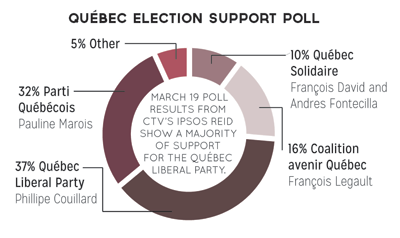Quebec’s General Election is set to take place on April 7, as the province gears up to elect members to the National Assembly.
This year’s election sees four major parties in contention: the incumbent Parti Québécois (PQ) led by Premier Pauline Marois, the Quebec Liberal Party under Phillipe Couillard, Coalition Avenir Québec under leader François Legault, and Québec Solidaire represented by François David and Andres Fontecilla.
The Parti Québécois (PQ)
The PQ is the incumbent party of the provincial government, having formed a minority government following their victory in the 2012 general election. In the last election, the party gained 54 seats—the most among other parties, but insufficient to form a majority government, which requires 63 of 125.
Aligned as centre-left on the political spectrum, the PQ is known for its advocacy for Quebec sovereignty. The question of Quebec sovereignty appears to have re-emerged at the forefront of the platform for the PQ in the upcoming election; however, Marois has insisted that her party will not call for a referendum in the near future.
In its two years of governance, the PQ has pushed for legislation such as Bill 14, a proposed language law which would have further institutionalized French within Quebec society through mandating usage of French in customer service and the workplace. Another controversial PQ initiative was the Charter of Values—a bill that would ban public sector workers from wearing conspicuous religious symbols. While the party eventually abandoned Bill 14, the Charter of Values remains a topic of controversy given its mixed reception across Quebec.
In terms of its economic platform, the PQ has unveiled a $2 billion job creation program, involving spending on improvement of infrastructure and development of the transportation system, CBC reported.
The Liberal Party
Led by Phillipe Couillard, the Parti Québec Liberal is the second largest political party in the province in terms of legislative influence, holding 50 seats in the National Assembly since 2012.
Succeeding Jean Charest as the leader of the Liberal Party in 2012, Couillard has struggled to unify the party’s stance on issues such as the Charter of Values (Bill 60). The Liberal Party initially rejected Bill 60’s proposal in September of last year. However, in January they took a stance that promoted the ban of some but not all religious symbols, including the chador, niqab, and burka for women working in the public sector, Global News reported.
Coming into the 2014 general election, the Liberal party has shifted their attention toward the economy, with a platform centred around a proposed $1.3 billion in spending cuts in the first two years of government, which they propose to enable by generating revenues through infrastructure development and a careful monitoring of costs. The Liberal Party also promises to generate a budget surplus by the 2015-2016 fiscal year through spending freezes, as reported by the National Post.
Coalition Avenir Québec (CAQ)
“Coalition for Quebec’s Future” is a centre-right party founded and led by former PQ minister François Legault in 2011. In its first election in 2012, the CAQ managed to gain 19 seats in the national assembly.
The CAQ’s platform seeks to divert attention away from the separationist arguments and focus more on the provincial economy. Legault, a self-made millionaire and one of the founders of Air Transat, is known for his business-friendly approach to the economy, promising a reduction of family taxes as well less bureaucracy and the decentralization of school boards and health agencies, according to CTV News.
The CAQ, like the Liberal Party, supports a compromised version of the Charter of Values that would still restrict religious symbols in the public sector to a certain extent.
Québec Solidaire (QS)
Québec Solidaire (QS) is a far-left social democratic party in favour of Quebec sovereignty. Straying from traditional Party leadership practices, the Party is represented by two co-spokespersons, Francois David and Andres Fontecilla.
Their platform promises to create 160,000 new jobs, favour alternate forms of energy, and invest $400 million to help hire more medical professionals in the province. The QS currently holds two seats in the National Assembly. The party also rejects the PQ’s proposed Charter of Values.
The election race
As of March 19, the Liberal Party held a five point lead over the Parti Québécois in a poll conducted by Ipsos Reid for CTV. Results showed that 37 per cent of voters would support the Liberals in an election, compared with 32 per cent for the PQ, 16 per cent for Coalition Avenir Québec, and 10 per cent for Québec Solidaire. However, the PQ remains the popular party among francophones, with 38 per cent saying they would vote for the party compared to 29 per cent who would vote for the Liberal party.
Students looking to vote must be entered on the list of electors and, on voting day:
– Be at least 18 years old.
– Be a Canadian citizen.
– Have lived in Quebec for at least six months.
Students can register to vote at their local Board of Revisors. Voting locations depend on your registered riding. Students can check their entry on to the list of electors by logging on to the Quebec Elections webpage.









Pingback: A Campus Conversation: anglophones in the Quebec election | McGill Tribune
The description for QS appears more to be an afterthought than anything else – starting with the misrepresentation of one of the party’s leaders Françoise (and not François) David, who has been probably given the strongest performance in the past couple debates. I’ll be skipping this “guide”.
Domiciled, not lived 😉